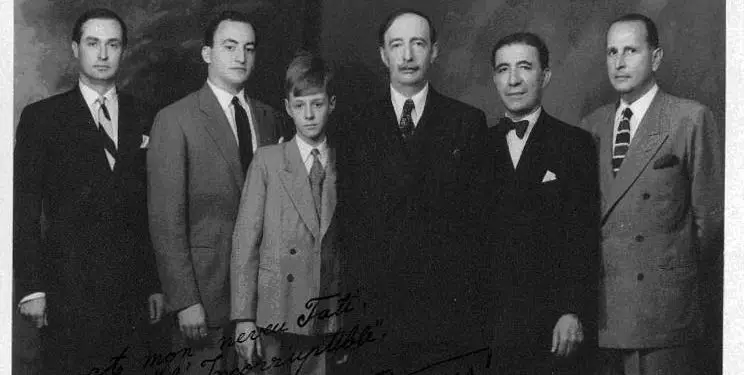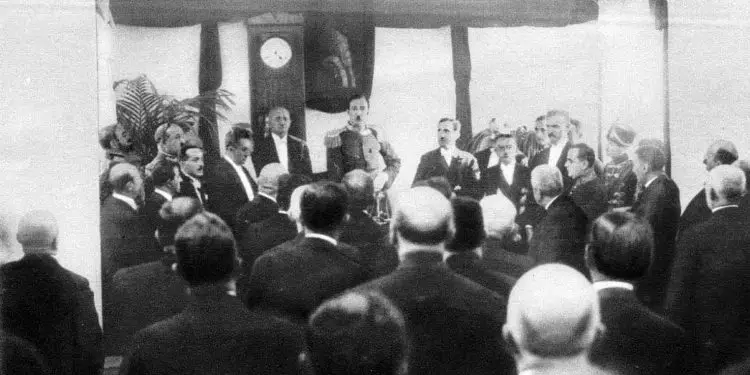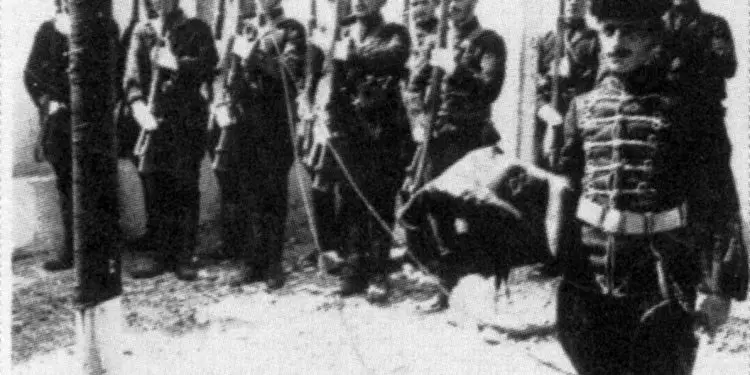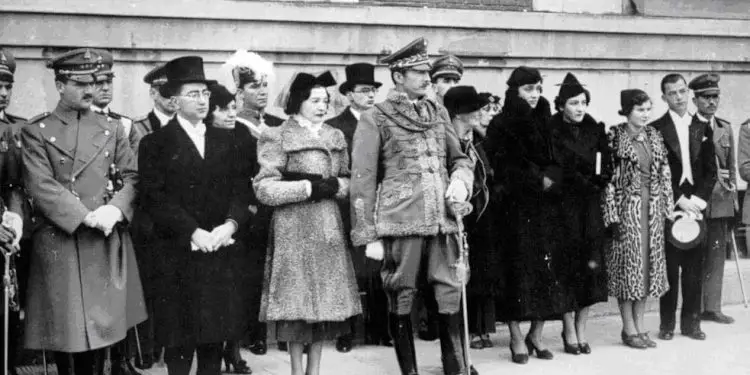Ekrem Spahiu
75th anniversary of the withdrawal of Nazi forces from Albania
The 75th anniversary of the withdrawal of German military forces from Albania is approaching, which is an important anniversary for the Albanian people and for all Albanian anti-fascist political and military forces. The political left wing, not having the power to get out of the complexes of politicized historiography, seems to continue to stand by the idea of appropriating the values and contributions of others in those historical moments for the future of Albania and the whole nation. Albanian.
But historical truth, however blurred, is difficult to assimilate. Nearly 30 years have passed since the fall of the communist dictatorship, and new facts have come to light from the archives, officially confirmed, about the political positions and real contributions of the Zogists in the resistance and struggle against the Nazi-fascist occupiers. In this context, the political attitudes and contributions of the kings are real, tangible and, rightly so, included in the golden fund of the history of the Albanian nation.
It is universally accepted that the relevant structures and the Albanian people organized themselves militarily and resisted with war the occupation of fascist Italy in 1939. Certainly, more could have been done, but no one can deny the military actions of the Albanian National Army, organized in defense against Italian occupation. This resistance stemmed from both the spirit and the military organization outlined by King Zog, and of course the kings had the obligation and responsibility to take on this role. In the anti-fascist resistance of April 1939, no organized political force took part, even for the fact that they were created two or three years later and were involved in obligations and responsibilities according to new interests and situations, related to the time of creation of them.
Fascist Italy had long been preparing for the invasion of Albania, either “peacefully” through political, economic, military and financial pressures, or by force of arms. After unsuccessful efforts and the final ultimatum to force King Zog, the Albanian parliament and government to submit, the Italian government decided to use force of arms to invade Albania.
Rejecting Mussolini’s terms and ultimatums, even though they had neither international support nor domestic strength to withstand fascist aggression, the Albanian Parliament and King Zog decided to host fascist Italy with arms in hand, unlike Austria, which had submitted to Germany. in 1933 without any objection, or Czechoslovakia that had not fired any rifles on March 15, 1939 when it was also invaded by Germany. Moreover, it should be noted that these two states were much larger than our country and armed with the most modern weapons of the time.
History speaks of an indisputable truth: the fact that Italy planned and introduced in the military operation for the occupation of Albania forces, means, expenses, logistics and time, shows that the occupier calculated the Albanian resistance. The Albanians did this resistance, despite not being victorious. The endurance, as we said above, had the spirit, seal and organization devised by King Zog. In every way you analyze the actions of his army, even the movements of the royal court and the King himself, it is confirmed that he stood firmly on the side of the great anti-fascist allies. He relied on them, sought their help, and kept their hopes.
Fascist Italy’s aggression against Albania was analyzed by the Italian side itself through the documents of the operation “Oltre Mare Tirana-OMT”, as it was codenally called the landing and occupation of Albania by Mussolini’s troops. In reference to these documents, the King of Italy – Victor Emmanuel III, on May 22, 1939 issued a decree for the decoration of 113 Italian officers and soldiers, who showed bravery on the battlefield during the “liberation” (occupation) of Albania: 12 military with gold medals for military bravery (posthumous i.e. 12 killed in combat), 15 with silver medals and 27 with bronze medals. The same decree awarded the war cross medal to 59 other Italian servicemen. In the justifications for awarding the respective decorations, he finds many details on how the fighting really took place, how and how organized was the resistance of the Albanian side against the landing of Italian troops.
While King Victor Emmanuel III decorates fallen Italian soldiers on the battlefield and others for bravery, communist historiography denies any attempt at resistance organized by the Kingdom, even accusing King Zog of selling Albania! But this accusation is irrevocably refuted by the Peace Treaty with Italy signed by the governments of the USA, USSR and Great Britain in Paris on February 10, 1947, where the communist government of its time, on September 4, 1945 demanded from the above governments the rights of the Albanian state to receive compensation from Italy as an occupying state and not as a state to which “Albania was sold”.
The question arises, why have the so-called historians and official institutions in Albania remained silent so far about this Treaty? The answer is very simple. The first point of this Treaty states: “Considering that Italy, under the fascist regime, has become one of the signatories of the tripartite pact with Germany and Japan, has undertaken a war of aggression and from this fact has provoked a state of war with all “Allied and Associated Powers as well as other nations and bears its share of responsibility in this war.” It is clear that Italy recognizes and admits that it has committed aggression against Albania. Meanwhile, Article 31 of this Treaty states: “Italy recognizes that all agreements and arrangements made between Italy and the authorities established in Albania by Italy between April 7, 1939 and September 3, 1943, are null and void.” The treaty decided that Albania would receive $ 5 million in damages from Italy (equivalent today to approximately $ 60 million). In addition to the amount of 5 million US dollars, Albania gained the right to own all assets belonging to the Italian state or citizens in Albania.
The legal interpretation of this Treaty insisted on by the Communist Government itself automatically leads us to the conclusion that the Kingdom of Zog, not only did not sell Albania as communist historiography claims, but it remains the legal subject of Albanian state heritage even after the fascist occupation.
Albania was aligned from the beginning with the anti-fascist coalition and the royals were clearly positioned politically and organizationally in the fight against fascism, becoming a natural part of the anti-fascist spirit of the Albanian people.
In this context, on September 16, 1942, the Peza Conference was held, attended by representatives of the Albanian anti-fascist forces, with the aim of forming a common war front against the occupier. The royal side was represented at the highest levels: Abaz Kupi was one of the main organizers of the Conference, while Ndoc Çoba was elected chairman of the conference. As is well known, the Conference elected seven members of the National General Council, two of whom were Zogists.
With the idea of expanding and strengthening the common front of the war against the Italians, Abaz Kupi became the initiator of the convening of the Mukje Conference held on 1-2 August 1943. Two days later, on 4-5 August 1943, the Committee for The Salvation of Albania, which emerged from the Conference, organized a joint battle near Qafë-Shtama against the Italian army, which was marching to Mat. The partisan, ballistic and Zogist gangs under the command of Major Abaz Kupi, defeated the enemy, inflicting heavy losses: 150 killed, among whom the Italian colonel A.P. Skampa, 40 wounded and 7 prisoners.
Enver Hoxha initially accepted the agreement, but this greatly angered the Yugoslav delegates Miladin Popovic and Dusan Mugosha. To this end, a month later, on September 4, 1943, the Communists convened the Labinot Conference, which not only formally annulled the Mukje Agreement, but declared armed war on the National Front and any other political current or trend. The Labinot Conference marks, in fact, the preparation of the conditions for a clash between the parties, which could go as far as civil war. The extent of this clash and its consequences deserve a separate analysis, but nevertheless one thing is true and unshakable: the nationalist politico-military forces, with the unifying national anti-fascist ideas they promoted, with the forms of organization they proposed and with the hostilities they waged, they tried to prevent that clash from happening.
However, after the Labinot Conference, the conflict situation between the communist-led forces and other nationalist forces was exacerbated, ranging from intrigue, infidelity and armed struggle, which also led to collective massacres, with responsibilities resting with the perpetrators. Only a few days after the Labinot Conference and the capitulation of fascist Italy, the Gerhot tragedy in Gjirokastra took place. On September 14, 1943, they killed the commander of Balli, Hysni Lepenicen and 35 commanders of Balli companies of the southern provinces of the country, who had military superiority in the areas of Vlora, Gjirokastra, etc. This tragedy caused as a result of the intrigue of the communist-led forces, marks a dangerous military moment, which could turn into a wider fratricidal clash between two forces of different Albanian political-military wings.
One month later, the first partisan brigade, commanded by Mehmet Shehu, on October 17, 1943 in Matjan, Lushnja, executed 67 villagers who had been mobilized by the Balli nationalist forces, commanded by Isa Manastirliu. The same politico-military leadership is the author of the Martanesh massacre on March 5, 1944 in the village of Peshk, where 22 nationalists were killed, led by their leader. Also, on March 7, 1944, 68 ballistas were killed in Dunica, Pogradec, to continue with 185 ballistas in Shipcka of Korca, etc
On November 21, 1943, the Zogists formed their own party.
In the face of this dangerous political-military reality with national consequences, the royal forces, to confirm their political legitimacy and to prevent the Communist Party from realizing its goal of eliminating Albanian nationalism, on November 21, 1943 in Zall-Herr, Tirana. , formed their own party, the National Organization “Legality Movement” (OKLL). Among the main points of the founding Congress was the return of King Zog to power, as only he enjoyed the right of legitimate power in Albania. Of course, after the creation of OKLL, the military organization was even greater. The British Mission led by high-ranking diplomats and military diplomats such as Bill Maclean, David Smiley and Julian Amery was attached to the forces of Abaz Kupi – Commander of the forces of Legality. The establishment of the OKLL alarmed Enver Hoxha and, to this end, the communist leadership convened the Përmet Congress on May 24, 1944, where its main decision was, “… forbid King Zog to return to Albania and not recognize any government that could to be formed inside or outside the country ”.
While the Nazi forces had lost the war and were retreating from Albania to Germany, the main objective of the communist leadership was to fight the Ballistic, Zogist and any other adversary forces. Since the communists had no support in the northern areas of the country, they engaged the most select forces of the partisan army in order to go there and destroy the nationalist forces, which enjoyed much support in these areas, and to use violence and terror to extend the missing influence in the civilian population, to create the full conditions for the power of tomorrow to be entirely theirs.
To prevent the realization of this ominous objective of the communists, both nationalist formations Legaliteti and Balli thought to take one last step, organizing a joint meeting, where they invited some leaders and bayraktars of the north. This meeting took place on September 15, 1944 in the village of Mali i Bardhë – Kurbin and then in Bulgër near Rubik. From the Legality side, Abaz Kupi participated with some Albanian officers accompanied by about 300 armed soldiers. With Abaz Kupin were the English missionaries attached to him. Balli Kombëtar was represented by Mit’hat Frashëri accompanied by squad commanders, officers and about 60 fighters. Also present were Muharrem Bajraktari, Gjon Markagjoni, Preng Previzi, Fiqri Dine, etc.
Only one issue was discussed at these meetings: the unification of all nationalist forces to prevent Albania from being occupied by communism. Unfortunately, this very important meeting in its purpose did not conclude, because, after much debate, it was judged that it was not in the national interest for Albanians to kill each other for tomorrow’s power, despite the fact that to some extent they knew what they were and what the communists would bring with their ideology. The failure to reach the desired conclusion from this meeting, paved the way for the partisan forces to remain the only ones in their tomorrow’s claims for power in all the provinces of Albania.
After this failure, Mit’hat Frashëri left for Shkodra and left for Italy, while the English missionaries informed Abaz Kupin that they had received orders to leave Albania. The commander of the forces of the National Organization “Legality Movement” Abaz Kupi, before leaving for Italy on October 24, 1944 issued a Call, which read, among other things: “jemi we have tried to unite and fraternize Albanians to avoid war civil and to secure the common struggle to remove the occupier from our holy land… Today in these circumstances we are forced to leave to avoid fraternal bloodshed”. The call was received by all the leaders of the legalist detachments and, based on it, with great pain, they stopped the war and dispersed their combat forces.
With the withdrawal of the leaders of Albanian nationalism not to oppose the communists, the latter, putting into practice the communist principle that power deals with the muzzle of a rifle, began to terrorize the civilian population to subdue it. To illustrate this terror of the communists, we are only mentioning the terrible massacre carried out in Lume, where on September 26, 1944, the commander of the fifth partisan brigade, Shefqet Peçi, shot without trial 21 innocent inhabitants of Buzëmadhe, under the pretext that they were defending Muharrem Bajraktarin.
With massacres, terror, rape and burning, the communist partisans took power in 1944, and under the false label of “liberation”, put under the hooves of the dictatorship of the proletariat the entire Albanian people, for 46 years. The destruction that communism did to the social, economic and political structure of the country turned out to be more severe than any invasion that this land had suffered in its entire history.
Based on the presentation of the above arguments and the chronological elaboration of the indisputable historical facts, it turns out that the Zogists were promoters of the war against the Nazi-fascist occupiers.
Former deputy & chairman of PLL














